Filter by
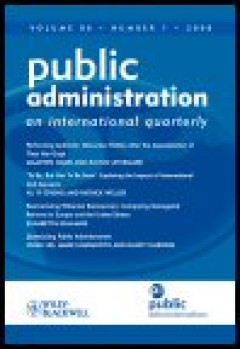
THINKING ON : A CAREER IN PUBLIC ADMINISTRATION
This article provides a brief intellectual history of my journey from traditional public administration through modernist-empiricism to an interpretive approach and its associated research themes; a story of how I got to where I am. I do so to provide the context for a statement of where I stand now and key themes in my research; a story of where I go from here. I have a vaulting ambition: to e…
- Edition
- Volume 89, Issue 1, March 2011. pages 196–212
- ISBN/ISSN
- 00333298
- Collation
- -
- Series Title
- Public Administration
- Call Number
- -
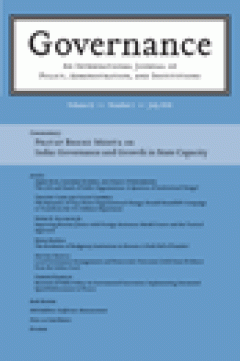
Explaining Policy Bandwagons : Organized Interest Mobilization and Cascades o…
Are all issues subject to the same attention from organized interests? If not, why not? This article utilizes data on organized interest mobilization in Scottish public policy to examine the pattern of engagement by policy participants across a large number of policy issues. It finds a heavily skewed pattern of mobilization: Most issues attract little attention, while a few issues account for t…
- Edition
- Volume 24, Issue 2, April 2011, pages 205–230
- ISBN/ISSN
- 09521895
- Collation
- -
- Series Title
- Governance
- Call Number
- -

The Durability of EU Civil Service Policy in Central and Eastern Europe after…
This article examines the post-accession durability of EU civil service policy in Central and Eastern Europe (CEECs). Civil service professionalization was a condition for EU membership but the European Commission has no particular sanctions available if CEECs reverse pre-accession reforms after gaining membership. Comparing eight CEECs that joined the EU in 2004, the article finds that post-ac…
- Edition
- Volume 24, Issue 2, April 2011, pages 231–260
- ISBN/ISSN
- 09521895
- Collation
- -
- Series Title
- Governance
- Call Number
- -

Civil Service Reforms in Italy : The Importance of External Endorsement and A…
The traditional portrait of civil servants in Italy, as well as in most other countries, has always been one of not particularly efficient employees yet have the benefit of a secure job and can look forward to a comfortable retirement package. In order to change this image, public management reforms have largely focused on civil servants since the 1990s. However, many academics and practitioner…
- Edition
- Volume 24, Issue 2, April 2011, pages 261–283
- ISBN/ISSN
- 09521895
- Collation
- -
- Series Title
- Governance
- Call Number
- -

The Internationalization of Early Childhood Education and Care Issues : Frami…
- Edition
- Volume 24, Issue 2, April 2011, pages 285–309
- ISBN/ISSN
- 09521895
- Collation
- -
- Series Title
- Governance
- Call Number
- -
- Edition
- Volume 24, Issue 2, April 2011, pages 285–309
- ISBN/ISSN
- 09521895
- Collation
- -
- Series Title
- Governance
- Call Number
- -

The Power of the Purse : Supranational Entrepreneurship, Financial Incentives…
This article shows how the European Commission cultivates policy shifts toward a particular idea of a common European Higher Education Area by using its considerable financial leverage. By making European Union (EU) funding dependent on grant recipients meeting certain strategically selected conditions, the Commission creates new incentive structures for domestic actors, in this case higher edu…
- Edition
- Volume 24, Issue 2, April 2011, pages 311–329
- ISBN/ISSN
- 09521895
- Collation
- -
- Series Title
- Governance
- Call Number
- -

Dimensions of Family Policy and Female Labor Market Participation : Analyzing…
This article investigates whether and how family policy influences the probability and intensity of mothers' labor market participation. Unlike previous studies, this contribution focuses on group-specific policy effects, thereby accounting for the fact that, theoretically, women with different resources and preferences should respond differently to given policy measures. The analyses show that…
- Edition
- Volume 24, Issue 2, April 2011, pages 331–357
- ISBN/ISSN
- 09521895
- Collation
- -
- Series Title
- Governance
- Call Number
- -

Why Do Private Governance Organizations Not Converge? A Political–Instituti…
Voluntary governance arrangements focusing on responsible business behavior have proliferated over the past decades, and in many sectors of industry, different governance organizations now compete for business participation. This private governance competition has negative consequences for the effective functioning of these arrangements. In the literature up until now, optimism prevails on how …
- Edition
- Volume 24, Issue 2, April 2011, pages 359–387
- ISBN/ISSN
- 09521895
- Collation
- -
- Series Title
- Governance
- Call Number
- -

Kerala's Ombudsman : A Mismatch of Mission and Capabilities
India, like many developing nations, has adopted many accountability institutions. One of these is the ombudsman. Originally a Swedish invention, ombudsman's offices were adopted by many countries over the last 50 years. Recently, the South Indian state of Kerala has instituted an ombudsman's office. While it has had notable successes in resolving minor cases related to local government institu…
- Edition
- Volume 24, Issue 2, April 2011, pages 389–392
- ISBN/ISSN
- 09521895
- Collation
- -
- Series Title
- Governance
- Call Number
- -
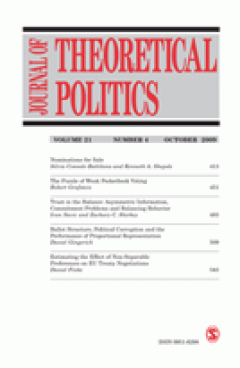
A model of non-informational preference change
According to standard rational choice theory, as commonly used in political science and economics, an agent�s fundamental preferences are exogenously fixed, and any preference change over decision options is due to Bayesian information learning. Although elegant and parsimonious, such a model fails to account for preference change driven by experiences or psychological changes distinct from inf…
- Edition
- Vol. 23 no. 2, April 2011.pp. 145-164
- ISBN/ISSN
- 09516298
- Collation
- -
- Series Title
- Journal of Theoretical Politics
- Call Number
- -

Paradox lost : Explaining and modeling seemingly random individual behavior i…
Despite a large body of experimental data demonstrating consistent group outcomes in social dilemmas, a close look at individual behavior at the micro level reveals a more complicated story. From round to round, individual behavior appears to be almost random. Using a combination of formal deduction and agent-based simulations, we argue that any theory of individual choice that accounts for the…
- Edition
- Vol. 23 no. 2, April 2011.pp. 165-187
- ISBN/ISSN
- 09516298
- Collation
- -
- Series Title
- Journal of Theoretical Politics
- Call Number
- -

Coordination dilemmas and the valuation of women in the U.S. Senate : Reconsi…
We offer a model of colleague valuation to illuminate the coordination challenges women legislators face. Our model predicts that women members� strategies depend upon whether they value women colleagues as much as men do, or instead value fellow women colleagues more highly. We test these predictions by analyzing leadership PAC campaign contributions U.S. Senators made to incumbent and challen…
- Edition
- Vol. 23 no. 2, April 2011.pp. 188-214
- ISBN/ISSN
- 09516298
- Collation
- -
- Series Title
- Journal of Theoretical Politics
- Call Number
- -

The origins of social institutions
How do individual agents enact the institutions that govern collective behavior in a social situation? How do individuals come to share self-enforcing expectations about collective behavior, so that societal rules and constraints have an effect on individual choice? Conventional accounts, such as contract and evolutionary theories or the analysis of conventions and social conflict, cannot expla…
- Edition
- Vol. 23 no. 2, April 2011 .pp. 215-240
- ISBN/ISSN
- 09516298
- Collation
- -
- Series Title
- Journal of Theoretical Politics
- Call Number
- -

Majorities with a quorum
Based on a general model of the �quaternary� voting rule, sensitive to voters� choices between four different options (abstaining, voting �yes�, voting �no� and staying at home), we systematically study different types of majority and quorum. The model allows for a precise formulation of majority rules and quorum constraints. For such rules four types of majority can be defined. We also conside…
- Edition
- Vol. 23 no. 2, April 2011.pp. 241-259
- ISBN/ISSN
- 09516298
- Collation
- -
- Series Title
- Journal of Theoretical Politics
- Call Number
- -

On the buyability of voting bodies
We study vote buying by competing interest groups in a variety of electoral and contractual settings. While increasing the size of a voting body reduces its buyability in the absence of competition, we show that larger voting bodies may be more buyable than smaller voting bodies when interest groups compete. In contrast, imposing the secret ballot is an effective way to fight vote buying in the…
- Edition
- Vol. 23 no. 2, April 2011.pp. 260-287
- ISBN/ISSN
- 09516298
- Collation
- -
- Series Title
- Journal of Theoretical Politics
- Call Number
- -
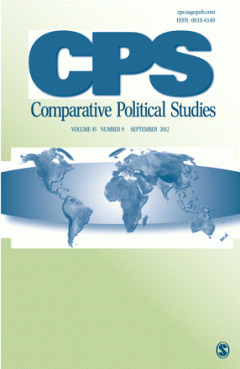
Cross-Cutting Issues and Party Strategy in the European Union
Has European integration affected national electoral politics beyond the margins? Experts describe its main impact as empowerment of radical voices. Mainstream parties avoid European Union (EU) issues that divide their left-or right-based organizations; extreme parties attack the EU and the center�s silence. But EU issues also generate important dynamics inside mainstream parties. The authors t…
- Edition
- Vol. 44 no. 4, April 2011.pp. 383-411
- ISBN/ISSN
- 00104140
- Collation
- -
- Series Title
- Comparative Political Studies
- Call Number
- -

Capitalist Systems, Deindustrialization, and the Politics of Public Education
Recent years have seen a number of studies on the determinants of educational spending. Almost all of the existing work emphasizes the importance of left-wing governments as a motor of expansion because such expansion allegedly ensures both redistribution and the facilitation of a supply-side economy. The existing literature thereby corroborates the power resource theory. Against this common wi…
- Edition
- Vol. 44 no. 4, April 2011.pp. 412-435
- ISBN/ISSN
- 00104140
- Collation
- -
- Series Title
- Comparative Political Studies
- Call Number
- -

Remote Control : How the Media Sustain Authoritarian Rule in China
This study examines the role of the media in sustaining regime stability in an authoritarian context. The article engages the recent work on authoritarian resilience in comparative politics but goes beyond the standard focus on elections to other important institutions, such as the media and courts, that are used by authoritarian leaders to bolster legitimacy. The authors find that the Chinese …
- Edition
- Vol. 44 no. 4, April 2011.pp. 436-467
- ISBN/ISSN
- 00104140
- Collation
- -
- Series Title
- Comparative Political Studies
- Call Number
- -

To Call or Not to Call? Political Parties and Referendums on the EU’s Const…
Why did some political parties in the EU member states support and others oppose a facultative referendum on the Constitutional Treaty? The authors argue that electoral competition played a major role in determining how parties positioned themselves with respect to the desirability of a referendum. Parties that expected electoral gains supported and those that expected electoral losses opposed …
- Edition
- Vol. 44 no. 4, April 2011 .pp. 468-492
- ISBN/ISSN
- 00104140
- Collation
- -
- Series Title
- Comparative Political Studies
- Call Number
- -
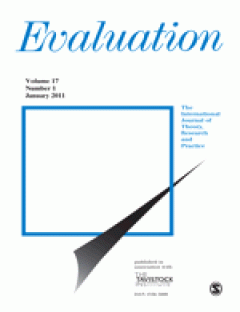
Homing in on excellence : Dimensions of appraisal in Center of Excellence pro…
Excellence has become a watchword for goal setting and assessment in science and technology policy. While the concept has been around for many years in its commonsense meaning, it is now explicitly used for science governance; however, so far little work has been done to detail, operationalize and systematize the dimensions of value present in academic evaluators� use of the concept. This artic…
- Edition
- Vol. 17 no. 2, April 2011.pp. 117-131
- ISBN/ISSN
- 13563890
- Collation
- -
- Series Title
- Evaluation
- Call Number
- -
 Computer Science, Information & General Works
Computer Science, Information & General Works  Philosophy & Psychology
Philosophy & Psychology  Religion
Religion  Social Sciences
Social Sciences  Language
Language  Pure Science
Pure Science  Applied Sciences
Applied Sciences  Art & Recreation
Art & Recreation  Literature
Literature  History & Geography
History & Geography